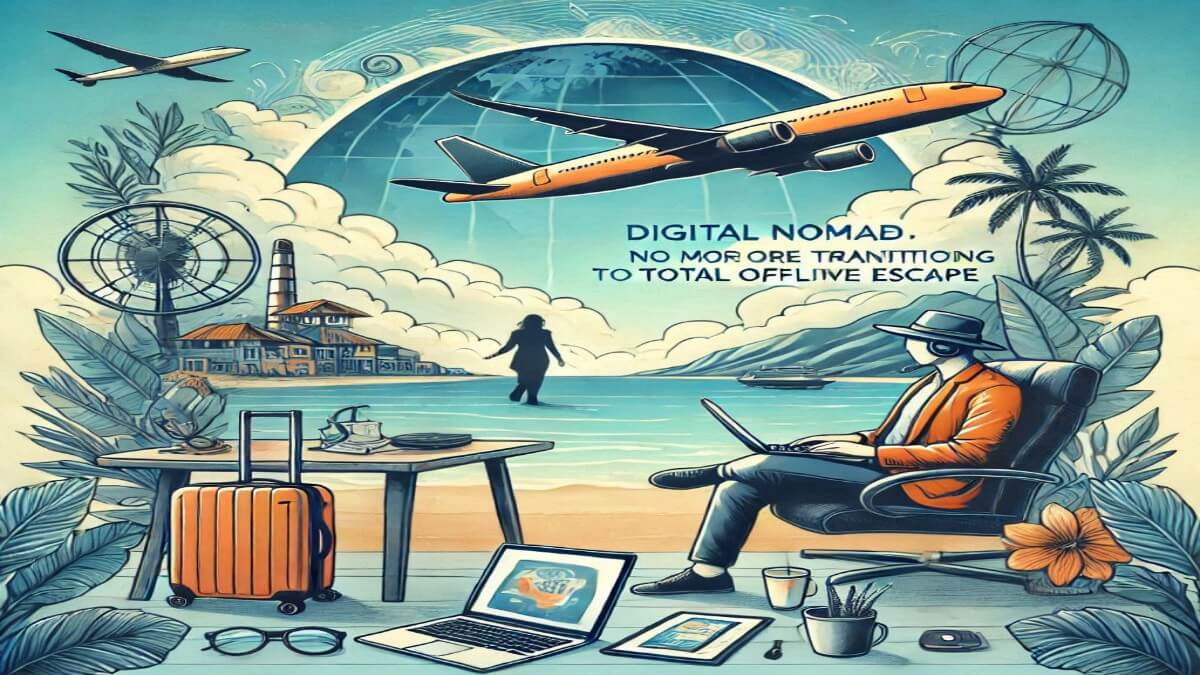For many of us, the digital nomad lifestyle once felt like the ultimate dream – roaming from country to country, laptops in tow, working from beach hammocks or bustling cafes. But what happens when you crave something deeper than just another exotic Zoom background? Perhaps you’ve reached a point where juggling work deadlines, time-zone differences, and spotty Wi-Fi is no longer the adventure it used to be. Maybe you yearn for a more rooted, low-tech, and mindful life. If you’re standing at that crossroads, this guide will show you how to gracefully shift from the location-independent hustle to a total offline escape – one where you can finally reconnect with your surroundings, your passions, and yourself.
Table of Contents
Recognize the Signs: Is It Time to Disconnect?
You might have spent years feeling the thrill of booking one-way tickets and chasing stable internet. But if any of these resonate, it could be time for a more permanent unplug:
- Restless Energy: The excitement of “newness” has worn off, and you’re craving stable connections (beyond your Wi-Fi).
- Burnout & Fatigue: You find yourself more exhausted than inspired by the nomadic routine – constantly navigating airport lounges, new currencies, and cultural norms.
- Desire for Deeper Roots: Instead of ephemeral coworking friendships, you’re longing for a local community, a home base, or a strong sense of place.
Pay attention to that subtle shift in your energy. When the wanderlust starts feeling like just plain wander-lost, it’s time to consider a new chapter.
Easing Out of Remote Work: Practical Steps
Evaluate Your Financial Landscape
Before you announce your last day online or pack up your gear, take a hard look at your income sources and savings:
- Emergency Fund: Aim for at least three to six months’ living expenses, especially if you’re leaving remote work entirely.
- Diversify or Downsize: Could you transition to part-time, freelance, or project-based gigs to maintain a modest income while stepping away from the daily grind?
- Low-cost Living Options: If you want to unplug in style, research areas where you can balance a simpler, nature-centered life with a reasonable cost of living.
Line Up Your Offline Escape
Going off-grid doesn’t mean you have to forego all modern comforts. Explore:
- Cabins or Eco-Lodges: Some provide amenities like solar power and minimal internet (useful for emergencies) while still shielding you from digital overload.
- Farm or Homestead Stays: Live on a working farm, learn to grow your own produce, and trade that laptop screen for hands-on tasks like tending gardens or caring for animals.
- Volunteer Programs: Whether it’s reforestation projects or wildlife conservation, many organizations offer immersive, offline experiences in exchange for labor and minimal fees.
Communicate Your Decision
If you’re transitioning gradually rather than taking an abrupt hiatus:
- Give Clients/Employers Notice: Let them know your availability will change. Offer clear timelines and handover processes to maintain goodwill.
- Automate or Delegate: Set up auto-responders or pass on responsibilities to trusted partners, ensuring a smooth exit from your digital obligations.
Cultivating an Offline Mindset: Beyond the Screen
Resist the Urge to Fill Every Gap
Remote work often trains us to optimize every spare moment: checking Slack in line at the grocery store, drafting emails while waiting for a flight. Moving offline requires unlearning this productivity obsession. Embrace slower rhythms: reading a physical book, journaling by hand, or simply watching the sunrise without instantly reaching for your phone.
Immerse in Local Communities
One of the greatest pleasures of going offline is reconnecting face-to-face with people and places:
- Language & Cooking Classes: Learn regional dialects or traditional recipes from locals. You’ll form deeper, more authentic bonds.
- Community Projects: Build or join local workshops – like pottery, handicrafts, or sustainable agriculture. Feeling part of a collective purpose can be more rewarding than chasing remote gigs.
Reintroduce Analog Hobbies
When your day isn’t segmented by email notifications or Zoom calls:
- Art & Craft: Sketch, paint, carve, or learn a musical instrument. Let creativity flow in a way that isn’t monetized or rushed.
- Nature Connection: Birdwatch, forage, or simply stargaze. Physical effort (like hiking or gardening) becomes a way to find presence and clarity.
- Personal Projects: Write that novel, practice photography (film camera, perhaps?), or explore the art of preserving foods. These skills anchor you in tangible tasks and real-world satisfaction.
Managing the Emotional Rollercoaster
Acknowledge “Digital Withdrawal”
Stepping away from the virtual world can feel disconcerting at first—like you’ve lost your safety net or social identity. It’s normal to experience a fear of missing out (FOMO) or even boredom. Recognizing these emotions is key to working through them.
Lean Into Self-discovery
Going offline isn’t just a logistical shift; it’s a personal transformation:
- Reflect on Values: What truly matters to you? Community? Health? Creative freedom? Let these answers guide your new daily patterns.
- Mindfulness Practices: Meditation, journaling, and breathwork can help you process the quiet moments and find clarity in your next steps.
Stay Open to a Hybrid Lifestyle
It’s possible you won’t want – or need—to be 100% offline forever. Some find a happy medium: a few months immersed in analog life, then short stints of remote work to fund future offline adventures. Or maybe a balanced schedule of limited internet usage each week. The important thing is to honor your unique needs without feeling shackled to technology again.
Celebrating the Shift: From Nomad to Nurturer
When you step away from the 24/7 connectivity treadmill, you’ll likely discover a profound sense of presence. Instead of optimizing time zones and spreadsheets, you might be learning the timing of seedlings, the cycles of the moon, or the nuances of local festivals. Suddenly, life becomes less about speed and more about depth.
- Richer Relationships: Being physically present for community events, family gatherings, and neighbors fosters a nourishing sense of belonging.
- Heightened Creativity: Without digital noise, ideas flow more freely. You might craft solutions to problems you never had bandwidth to address before.
- Sustainable Living: Often, offline retreats encourage a more eco-friendly, minimalistic lifestyle – reducing consumption, waste, and carbon footprints.
Conclusion
The digital nomad journey can be exhilarating, but if you’re feeling the call to unplug, know that an offline escape can be just as thrilling – maybe even more profound. Free from constant notifications and the frenetic tempo of remote gigs, you’ll carve space to rediscover what truly lights you up inside.
Whether you choose an eco-lodge in the jungle, a cozy cabin by the lake, or a humble homestead in the mountains, give yourself permission to evolve beyond the laptop. You’ll return to the digital realm (if you choose to) with renewed perspective, creativity, and purpose.Ready to take the leap? Share your thoughts or questions in the comments below, and don’t forget to subscribe to BreatheOffline.com for more mindful travel stories, tips, and life transitions that honor authenticity over hustle. Adventure awaits – beyond the screen.

